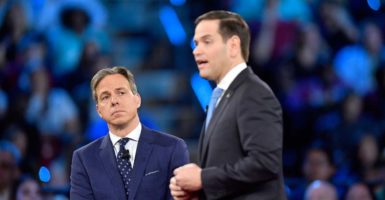How much of a problem is “fake news,” really?
According to a discussion on the issue at the Conservative Political Action Conference, or CPAC, the U.S. media environment is in poor shape and has damaged its reputation with Americans.
Among other things, the panel moderated by WMAL radio host Larry O’Connor talked about media coverage in the Trump era, hot-button issues such as gun control, and the need for more involvement by citizen journalists.
Chris Loesch, a journalist who is the husband of Dana Loesch, a spokeswoman for the National Rifle Association, spoke about his wife’s appearance Wednesday on a highly contentious CNN “town hall” program on gun control.
Sen. Marco Rubio, R-Fla., was roundly booed during the CNN event as he tried to make points. The event appeared to be stacked against Rubio and other supporters of gun rights, Loesch said at CPAC:
The questions were chosen in advance, that was obvious because they were able to hand the microphone to the next person that was going to speak, or ask a question. I think at one point it got a little messed up because one of the young men asked Dana a question when she was not even on stage yet.
Kimberley Strassel, a columnist for The Wall Street Journal, said that the news media has failed to do due diligence in pursuing stories that don’t fit a desired narrative, and has struggled with truth and credibility after the election of President Donald Trump.
The media obsesses over trivial things such as “how many Diet Cokes” Trump drinks, Strassel said, but often fails to pursue stories with more serious implications.
“The press allows itself to be a part of one of the dirtiest political tricks of all time,” she said in reference to the anti-Trump “dossier” compiled by former British spy Christopher Steele and its connection to the allegations that the Trump campaign colluded with Russia.
Strassel has written about this topic for The Wall Street Journal.
“Washington and the press corps are feuding over the Trump ‘dossier,’ screaming about what counts as ‘fake news,’” she wrote in January. “The pity is that this has turned into a story about media ethics. The far better subject is the origin of the dossier itself.”
The media should have immediately picked up on the fact that the document was “political opposition research” financed by the Democratic National Committee and the Hillary Clinton campaign, Strassel said, but many journalists failed to see the obvious warning signs.
Lawrence Jones, editor-in-chief of Campus Reform, a conservative website that is a watchdog of college news and trends, said Americans need “to go on the offensive” to combat fake news.
“We are watching the slow and painful death of the mainstream media,” Jones said.
There must be more “citizen journalists,” he said, those who take it upon themselves to cover stories that professional reporters don’t or won’t.
“There is not an unbiased press,” Jones said.
CPAC, the largest annual national gathering of conservative activists, runs Thursday to Saturday at the Gaylord National Resort and Convention Center in National Harbor, Maryland, just outside Washington.




























